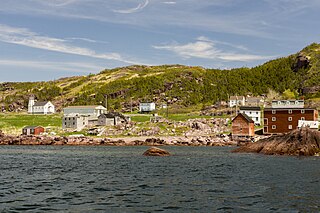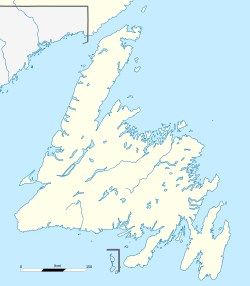
Come By Chance is a town on the isthmus of the Avalon Peninsula in Newfoundland and Labrador, Canada. It is in Division 1 on Placentia Bay.

The Trans-Labrador Highway (TLH) is the primary public road in Labrador, the mainland portion of the province of Newfoundland and Labrador, Canada. The highway's total length is 1,149 km (714 mi). The paving of the entire highway was completed in July 2022.

Lewisporte is a town in central Newfoundland, Canada, with a population of 3,288. It is situated in Burnt Bay which opens on to the Bay of Exploits. Lewisporte has a deep water port and related facilities that serve many communities in the region.
Piccadilly Slant-Abraham's Cove is a local service district and designated place in the Canadian province of Newfoundland and Labrador. It is located on the island of Newfoundland, along St. George's Bay, on the Port au Port Peninsula. The DPL consists of the fishing villages of Abraham's Cove and Piccadilly.

Portugal Cove–St. Philip's is a rural seashore community located on the eastern Avalon Peninsula of Newfoundland in the province of Newfoundland and Labrador, Canada. The town is a bedroom community of the provincial capital of St. John's.

St. George's is a Canadian community in the St. George's Bay on the southwest coast of Newfoundland of the province of Newfoundland and Labrador.

Blanc-Sablon is a municipality located on the shore of Blanc-Sablon Bay, in the Strait of Belle-Isle, Le Golfe-du-Saint-Laurent RCM, Côte-Nord, Quebec, Canada.

Port au Port West-Aguathuna-Felix Cove is a small town located on the Port au Port Peninsula of the Island of Newfoundland, Canada. The nearest large service area is Stephenville. The town was created in 1970 by amalgamating the small villages of Port au Port West, Aguathuna and Felix Cove. Its post office began on September 11, 1964. The first Post Mistress was Reisa Gabriel.

Open Hall-Red Cliffe is a local service district and designated place in the Canadian province of Newfoundland and Labrador.
Gallants is located northeast of Stephenville, Newfoundland and Labrador, Canada. It was created as a Local Government Community on August 16, 1966.

Gaultois is a small settlement in the Coast of Bays area in Newfoundland and Labrador, Canada. Gaultois had a population of 100 people in the 2021 census. The town has a K-12 school called Victoria Academy, as well as a fire department, public library, Lion's Club, and town hall. The town is only accessible by ferry or helicopter. The provincial government ferry runs from the nearby town of Hermitage several times daily and the crossing takes approximately 20 minutes. This ferry also services the more remote community of McCallum once to twice daily with a crossing time of around one hour and fifteen minutes. In 2015, Gaultois voted against resettlement. Gaultois considered resettlement again in 2023 but it failed.

Rose Blanche–Harbour le Cou Town on Newfoundland's southwest shore, about 45 km from Port aux Basques, at the end of Route 470.

Nipper's Harbour is a town located on the east coast of the Baie Verte Peninsula of Newfoundland in the Canadian province of Newfoundland and Labrador. This incorporated community of 85 people is located on a rocky inlet that combines Nipper's Harbour and Noble's Cove, and where the primary industry is the inshore fishery. The town is approximately 58 km from Baie Verte.

Flatrock is a town in Newfoundland and Labrador. The town had a population of 1,722 in the Canada 2021 Census.

McIvers is a town in the Canadian province of Newfoundland and Labrador. The town had a population of 575 in the Canada 2021 Census. The town celebrated its Come Home Year in 2017, following a successful Chase the Ace fundraiser the previous year which largely funded the event. The town is located on the north shore of the Bay of Islands, Newfoundland and Labrador.
Pacquet is a town in the Canadian province of Newfoundland and Labrador. The town had a population of 145 in 2021, down from 184 in the Canada 2011 Census.
Fox Island River-Point au Mal is a local service district and designated place in the Canadian province of Newfoundland and Labrador. It is northwest of Stephenville.

Mount Pearl is the fourth-largest municipality and second-largest city in Newfoundland and Labrador, Canada. The city is located southwest of St. John's, on the eastern tip of the Avalon Peninsula on the island of Newfoundland. Mount Pearl is the fourth largest municipality in the province and is part of the St. John's metropolitan area, the 20th largest metropolitan area in Canada.
Snook's Arm is a designated place in the Canadian province of Newfoundland and Labrador. The community was entirely resettled in 2018.
St. Teresa is a local service district and designated place in the Canadian province of Newfoundland and Labrador.















